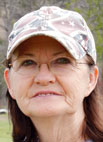
Stan and Donna Johnson run a creamery in Wyandotte, Okla., distinguished from a dairy because in addition to milking, the operation also produces dairy products.
The products include raw milk, vat pasteurized whole and nonfat milk, butter, soft and hard cheeses and skyr (Icelandic yogurt).
What this means in terms of lifestyle is that the Johnsons have all of the work of a traditional dairy with twice milking daily, heifer care and breeding, as well as myriads of additional chores involved with vat pasteurizing, commodity production, and the extra high cleanliness standards required for food preparation.
While Stan’s family is among the first Arkansan white settlers, Donna’s ancestors arrived in Missouri before the Trail of Tears, meaning both have long family ties to the area. Both are veterinarians and met at the USDA. Stan retired from USDA in safety and inspection while Donna teaches anatomy and physiology at Missouri Southern State University in Joplin, Mo. Less than a year ago, time/work management reached crisis levels which resulted in the Johnsons hiring three employees: a herdsman, a general maintenance man and someone to help with food production.
“We had to expand or fold and we chose to expand,” Donna said. “Our eldest son John, 18, was our machine specialist but is away at school, so we were down to the help of our other two children. Will, 15, is a true dairyman and all around help while our daughter Grace, 14, is our calf, house and hearth caretaker.”
The Johnson creamery named Lomah, as in the “Land of Milk and Honey,” has been open for 12 years. Four hundred acres support 80 Jersey cows with 60 being milked at one time. The operation has two clean up bulls. Artificial insemination is the standard form of breeding for the Johnson cattle, a duty that had fallen to the new herdsman.
Because the Johnsons cater to an environment and health conscious market niche, they selected Jerseys because the breed produces A2 quality milk meaning it is higher in protein, beta-carotene, fatty acids, fat content and calcium. Some people who suffer from milk sensitivity maintain they easily digest additive free milk.
For the Johnsons, the higher quality milk far outweighs the lower production of Jerseys as compared to Holsteins. Another advantage of the Jerseys is smaller calves that grow quickly.
“I rarely need to pull any calves,” Stan said.
The Johnson Jerseys are raised without confinement, which gives them more exercise and, according to Stan, prevents metabolic disorders more common in cattle raised in smaller pastures. Pasture size also eliminates the need for worming, one less chemical necessary for health protocols. Chemical exposure is also limited by minimal use of antibiotics on a case-by-case basis rather than as a part of a routine. Jerseys also have greater tolerance for heat and cold, which results in less temperature impact on milk production and taste. One advantage of the Johnson acreage is the presence of two Artesian springs that produce 2 million gallons of fresh, clear water a day. The presence of this high-quality water also increases the quality of the herd’s milk.
Pastures are primarily Bermuda, Fescue and Prairie Grass, long with naturally occurring clover. The Johnsons raise their own hay and supplement with an 18 percent protein cottonseed and whole corn feed containing no byproducts or soy. The cottonseed increases butterfat content while eliminating soy avoids hormonal issues. Will, a freshman in a local college, is interested in forage and pressing for the addition of alfalfa and sugar beets as part of their nutrition regimen.
“Cows really like sugar beets, and alfalfa is higher in protein with both able to promote better health and production,” Will explained.
The farm is transitioning to a non-Genetically Modified Organisms (non-GMO) facility.
“(It) is something our customer base is interested in,” Stan said.
When the Johnsons decided to go into cheese making, they traveled to France and the Netherlands for equipment and non-GMO cultures. Currently they produce coulommiers, raclette (the original fondue cheese) cheddar and Havarti, but are looking to add aging space in order to produce blue cheese. The butter is European-style cultured butter and yogurt is being added to the Icelandic Skyr yogurt.
In addition to sales right off the farm, the Johnsons currently make two runs a week to Tulsa, Okla., as well as delivering to stores locally and offering producers pickup and further retail marketing. Now that the Johnsons have hired help, they are looking toward more diversity in their processed products and expanding their retail markets into Arkansas.
“We really don’t want to increase the size of our herd because we’re at a maximum if we are to know each animal individually, something I consider essential,” Stan said. “Nonetheless, we are in the early stages of maximizing our potential, and our children will have a great deal of say in what the future holds.”







